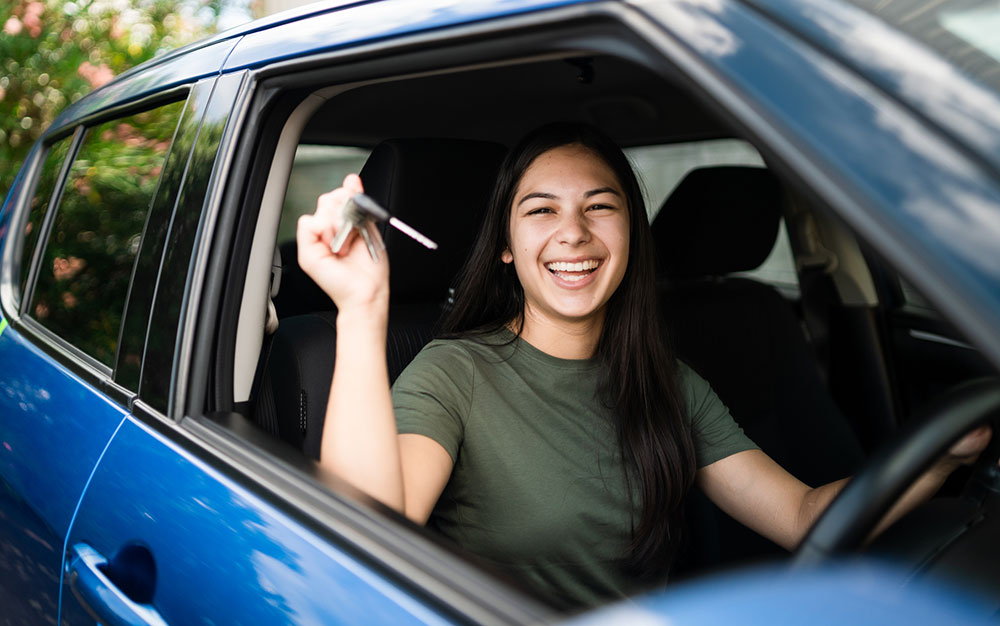Four things to do before buying your first car
Getting the right car for the right price can be tricky, but it's not impossible.

1. Determine your budget
The price of the car only represents a part of the total cost. There are many expenses, both one-time and ongoing, that you’ll need to take into consideration when working out your budget.
- Fuel
- Registration
- Stamp duty
- Car insurance
- Servicing and maintenance
- Parking permits and tolls.
Take a hard look at your finances and work out both how much you have saved towards the purpose price and the maximum monthly expense you can afford. Keep that number in mind and don’t go over it no matter how much you love a car.
2. Do your research
Once you know how much you have to spend, it’s time to do some research about potential cars. Some places to start looking include:
- Manufacturer’s websites
- Buyer guides in car magazines or newspapers
- Reliability surveys
- Australasian New Car Assessment Program (ANCAP) ratings
- Fuel consumption ratings
- Tips for picking a cheaper car
- Choose cars with a smaller engine
- Choose manual instead of automatic transmission
- Smaller cars cost less to insure
- Pre-registered cars come with chunky discounts (because the dealer is the owner)
3. Complete safety checks
New cars are obviously more expensive, but also come with peace of mind, as they are protected by warranty. You’ll have more choices with a new car, as well as the latest technology and brand-new mechanics.
Second-hand cars are much more of a bargain, but also present a risk of potentially buying a lemon. You can mitigate some of the risk by asking the right questions:
- How long has the seller owned the car?
- How many owners has the car had?
- Why is the car for sale?
- How many kilometres has the car done?
- Is a full service history available for the car?
- Has it been in a crash?
- Is it usually stored in a garage?
You should also thoroughly inspect the car. The best way to do an inspection is with an RACQ-approved trusted mechanic. If there are any major mechanical problems, you should avoid buying that car. If there are only a few minor problems, you can use them as leverage to negotiate a better price with the seller.
4. Test drive the vehicle
You always want to take a car, new or used, for a test drive. You’ll get a feel for how it handles, but you’ll also uncover some potential problems. Bringing your friend who’s the biggest motor-head to get some perspective is a great idea.
Related topics
Things to note
The information in this article has been prepared for general information purposes only and is not intended as legal advice or specific advice to any particular person. Any advice contained in the document is general advice, not intended as legal advice or professional advice and does not take into account any person’s particular circumstances. Before acting on anything based on this advice you should consider its appropriateness to you, having regard to your objectives and needs.
Insurance Products (excluding Travel Insurance) are issued by RACQ Insurance Limited ABN 50 009 704 152 (RACQI) and arranged by RACQ Distribution Services Pty Ltd (RDS) ABN 35 116 361 650, AFSL 567130 and RDS' authorised representatives (including RACQ Operations Pty Ltd ABN 80 009 663 414, AR No. 234978 (RACQO)). Conditions, limits and exclusions apply.
Any advice provided by RDS and RACQO is general advice only and does not take into account your personal objectives, financial situation or needs and you will need to consider whether the advice is appropriate for you. Read the Product Disclosure Statement (PDS) before making a purchase decision on the product. You can also access our Target Market Determinations on this website.
RDS receives a commission from RACQI for the policies it arranges. RACQO receives fees paid for services it provides to RDS. Further details about remuneration are available on request prior to purchasing.
Banking and loan products issued by Members Banking Group Limited ABN 83 087 651 054 AFSL/Australian credit licence 241195 trading as RACQ Bank. Terms, conditions, fees, charges and lending policies apply. This is general advice only and may not be right for you. This information does not take your personal objectives, circumstances or needs into account. Read the disclosure documents for your selected product or service, including the Financial Services Guide and the Terms and Conditions, and consider if appropriate for you before deciding.
Except for RACQ Bank, any RACQ entity referred to on this page is not an authorised deposit-taking institution for the purposes of the Banking Act 1959 (Cth). That entity’s obligations do not represent deposits or other liabilities of RACQ Bank. RACQ Bank does not guarantee or otherwise provide assurance in respect of the obligations of that entity, unless noted otherwise.
RACQ Bank subscribes to the Customer Owned Banking Code of Practice which establishes higher standards than the law requires. The Code reflects modern consumer expectations and developments in approaches to issues such as consumer vulnerability, guarantors, and supporting customers through financial hardship. Please read our Customer Owned Banking Code of Practice page for more information.
RACQ Operations Pty Ltd (ABN 80 009 663 414 AR 000234978) and Members Travel Group Pty Ltd (ABN 45 144 538 803 AR 000432492) are acting as an Authorised Representative of the issuer of the insurance, Tokio Marine & Nichido Fire Insurance Co., Ltd. (ABN 80 000 438 291 AFSL 246 548). Any advice set out above is general in nature only, and does not take into account your objectives, financial situation or needs. Before purchasing any travel products, please consider the RACQ Travel Insurance Product Disclosure Statement (PDS) and the Target Market Determinations (TMDs) that apply to these products. Whilst the PDS outlines the Terms and Conditions of these products, the TMDs outline the intended class of customers that comprise the target market for these travel products. This will allow you to consider which products best suit your objectives, financial situation and needs and consider the products appropriateness to your personal circumstances. TMDs also outline matters involving the distribution and the review of these products. The PDS, Supplementary PDS and TMDs for each travel product can be found here.
